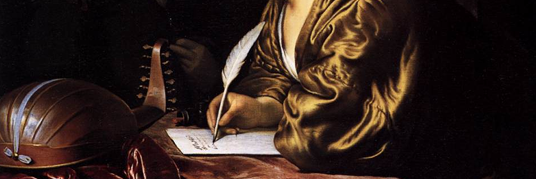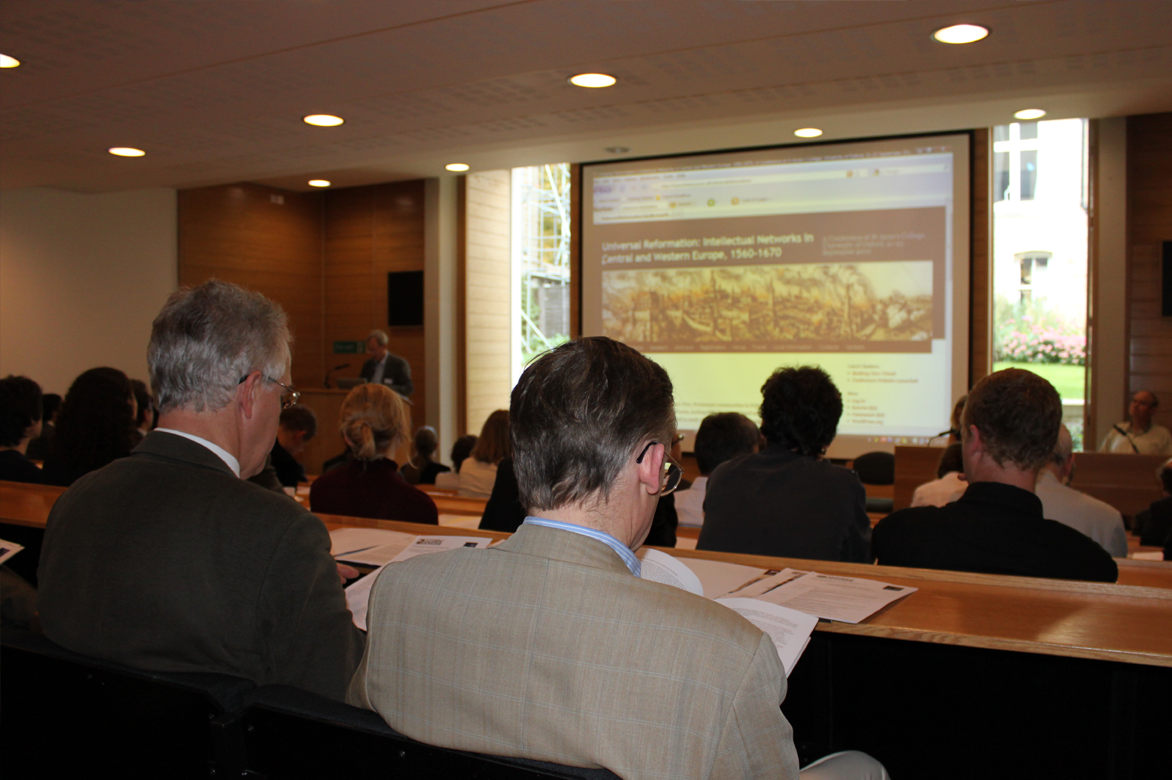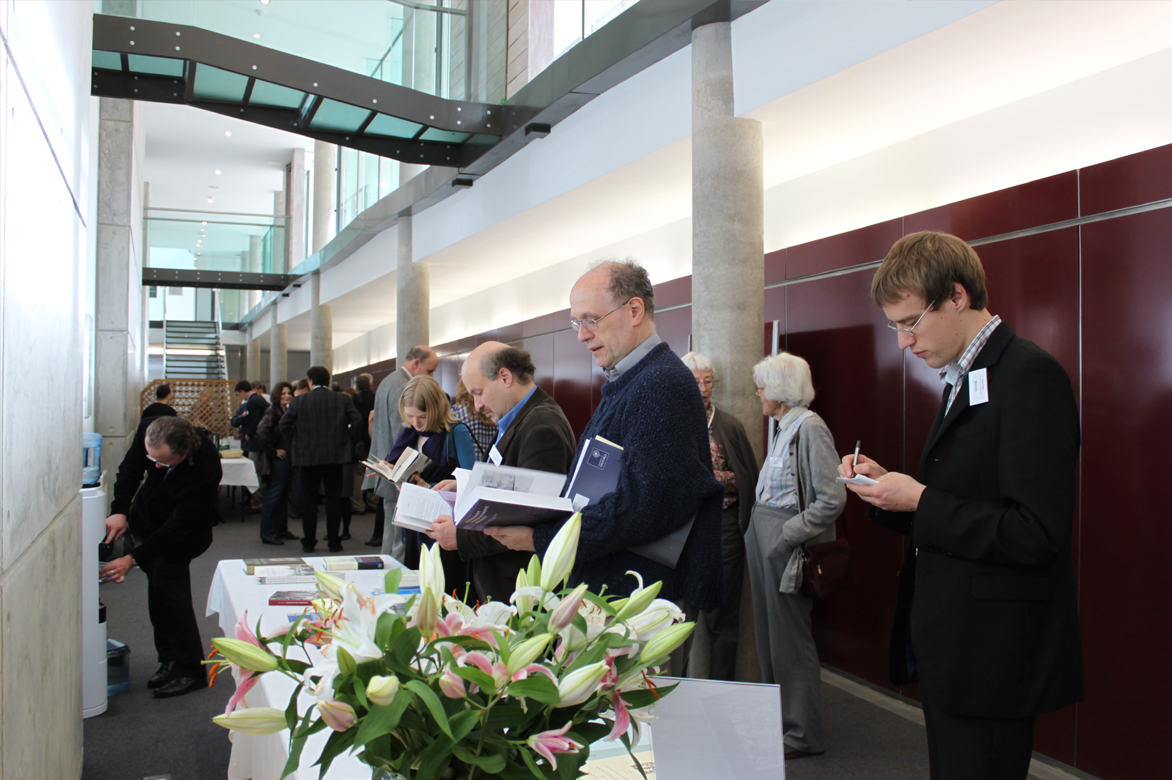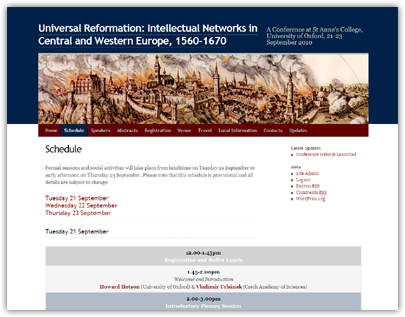* You are viewing Posts Tagged ‘Communication’
James Brown
June 09, 2011
Events, Lectures, Project Updates
Tags: Archives, Communication, England, Materiality, Networks, Politics, Religion, Scribal Copies, Seventeenth Century, Sixteenth Century
 In the fifth paper of our seminar series on Thursday 2 June, Professor James Daybell (University of Plymouth) delivered a fascinating paper entitled ‘The Scribal Circulation of Early Modern Letters’. Debuting material from his forthcoming book on the materiality of the letter, and in a slight change from the advertised title, Daybell provided a sophisticated overview of the ‘complex textual afterlives’ of letters beyond their initial composition, sending, and receipt; a conceptualization which challenges prevailing views of early modern epistolarity as a private, historically anchored exchange between only two individuals. By means of a rich range of political and religious examples from early modern England, Daybell traced several consecutive phases of subsequent manuscript dissemination: the controlled circulation of epistolary separates through private copying within discrete manuscript networks; a less discriminate casting abroad; commercial scribal publication within anthologies and miscellanies (in which copies of letters co-mingled with verse, libels, prose, and other manuscript genres); and finally, in many cases, print publication. Daybell also provided insights into the postal conditions which facilitated scribal transmission in early modern England, a surprisingly makeshift mixture of different delivery methods (ordinary posts, royal posts, messengers, carriers, servants, and chance travellers) until the introduction of a more stable and predictable postal structure with the founding of the post office in 1635. Questions focussed on the role of London and the universities as entrepôts for scribal dissemination; the costs of delivery; the anxieties and self-censorship engendered by the instability and porosity of the early modern postal network; and the distinction between ordinary street copies and scribal separates produced by commercial scriptoria. Seminars take place in the Faculty of History on George Street on Thursdays at 3pm. For future talks in the series, please see the seminar webpage.
In the fifth paper of our seminar series on Thursday 2 June, Professor James Daybell (University of Plymouth) delivered a fascinating paper entitled ‘The Scribal Circulation of Early Modern Letters’. Debuting material from his forthcoming book on the materiality of the letter, and in a slight change from the advertised title, Daybell provided a sophisticated overview of the ‘complex textual afterlives’ of letters beyond their initial composition, sending, and receipt; a conceptualization which challenges prevailing views of early modern epistolarity as a private, historically anchored exchange between only two individuals. By means of a rich range of political and religious examples from early modern England, Daybell traced several consecutive phases of subsequent manuscript dissemination: the controlled circulation of epistolary separates through private copying within discrete manuscript networks; a less discriminate casting abroad; commercial scribal publication within anthologies and miscellanies (in which copies of letters co-mingled with verse, libels, prose, and other manuscript genres); and finally, in many cases, print publication. Daybell also provided insights into the postal conditions which facilitated scribal transmission in early modern England, a surprisingly makeshift mixture of different delivery methods (ordinary posts, royal posts, messengers, carriers, servants, and chance travellers) until the introduction of a more stable and predictable postal structure with the founding of the post office in 1635. Questions focussed on the role of London and the universities as entrepôts for scribal dissemination; the costs of delivery; the anxieties and self-censorship engendered by the instability and porosity of the early modern postal network; and the distinction between ordinary street copies and scribal separates produced by commercial scriptoria. Seminars take place in the Faculty of History on George Street on Thursdays at 3pm. For future talks in the series, please see the seminar webpage.
 Podcast now available on the seminar page!
Podcast now available on the seminar page!
The 11th Bucharest-Princeton Seminar in Early Modern Philosophy, which will take place in Bran, Transylvania on 2–8 July 2011, is currently seeking contributions. Organised by the Research Centre for the Foundations of Modern Thought (FME) at the University of Bucharest in collaboration with the Philosophy Department at Princeton University, this year’s event takes as its theme Collaborative Aspects of Early Modern Thought: Philosophical Correspondence and the Republic of Letters. The deadline for the receipt of one-page abstracts and CVs is 27 April 2011. For submission instructions, as well as details of registration, costs, and keynote speakers, please visit the seminar webpage.
 A symposium on Early Modern Data Delivery will take place in the English Faculty of the University of Oxford on Monday 28 February 2011. The event will focus on letters as a manifestation of seventeenth-century information exchange, and will feature the following contributions:
A symposium on Early Modern Data Delivery will take place in the English Faculty of the University of Oxford on Monday 28 February 2011. The event will focus on letters as a manifestation of seventeenth-century information exchange, and will feature the following contributions:
- Johanna Harris (University of Exeter), ‘Obstinate Letters: Lady Brilliana Harley’s Defence of Brampton Bryan’
- Kate McLoughlin (Birkbeck, University of London), ‘Information Delivery in Shakespeare’s Macbeth and Stoppard’s Cahoot’s Macbeth: A Habermasian Reading’
- Katherine Duncan-Jones (University of Oxford), ‘A ‘Tragicall’ Letter (c. 1604): Writer, Recipient, Bearer’
The symposium will be held in Lecture Room 2 from 5pm.
Kim McLean-Fiander
November 12, 2010
Calls for Papers, Conferences and Workshops, Events, Project Updates
Tags: Censorship, Commerce, Communication, Exchange, Networks, Propaganda, Seventeenth Century

A Woman Writing a Letter (1680) by Frans van Mieris
The University of Reading Early Modern Studies Conference will take place 18–20 July 2011. Organised by the Early Modern Research Centre, the conference takes as its theme Communication and Exchange and will feature both a panel on Cultures of Knowledge and a plenary session by the Project Director Professor Howard Hotson. The conference hopes to generate new thinking and debate on such questions as: what forms did communication and information take (oral, printed, numerical, or even visual), how did its forms change, and how was it circulated; what did people know about the world outside their own immediate spheres in the early modern period; what new techniques for the calculation and expression of information appeared; how far was information managed by government through propaganda and censorship or the maintenance of secrecy; did changing practices of communication stimulate the emergence of new genres; how did the stock of knowledge of the world increase through the endeavours of seamen, merchants, factors and adventurers as well as scientists and travel writers; and what part did patronage and the commerce in books and manuscripts play? The deadline for paper and panel proposals is 31 January 2011. Further details are available in the full call for papers (pdf).
James Brown
October 12, 2010
Conferences and Workshops, Events, Project Updates
Tags: Communication, Encyclopaedism, Europe, History of Science, Jan Amos Comenius, John Aubrey, Millenarianism, Networks, Pansophia, Samuel Hartlib, Seventeenth Century, Universities

The opening plenary session.

Relaxing in the foyer.
The Project’s inaugural conference, Universal Reformation: Intellectual Networks in Central and Western Europe, 1560-1670, took place at St Anne’s College on 21–23 September 2010. The event, which was attended by over ninety delegates, built on three preparatory European workshops (held in Prague, Cracow, and Budapest), and allowed forty-two emerging and established scholars from eleven countries to share their perspectives on the international networks and intellectual traditions brought into being by the upheavals of the Thirty Years War. Themes explored included institutional networks and intellectual exchange, encyclopaedia and pansophia, the early modern European media revolution, ecclesiastical reconciliation, and millenarianism, prophecy, and propaganda. Delegates also enjoyed a drinks reception in the Bodleian Library‘s historic Divinity School (incorporating a private viewing of the exhibition ‘My Wit was Always Working’: John Aubrey and the Development of Experimental Science), and were present for the prototype launch of our union catalogue. For further information, including speaker profiles and abstracts, please visit the conference microsite; for details of our 2011 event, please visit the conference webpage.
James Brown
July 16, 2010
Conferences and Workshops, Events, Project Updates
Tags: Communication, Encyclopaedism, Europe, Jan Amos Comenius, Networks, Pansophia, Politics, Religion, Samuel Hartlib, Seventeenth Century
 We are pleased to announce that booking is now open for ‘Universal Reformation: Intellectual Networks in Central and Western Europe, 1560-1670’, the first Project conference, which will take place at St Anne’s College, Oxford, on 21-23 September 2010. Organised by Howard Hotson and Vladimír Urbánek, the event will showcase the work of a diverse group of emerging and established scholars, many from east central Europe, who will converge on the intellectual networks and traditions engendered by the upheavals of the Thirty Years War. For provisional programme information, a steadily growing lists of speaker profiles and abstracts, and to book online, please see the new conference website. The deadline for registration is Friday 10 September.
We are pleased to announce that booking is now open for ‘Universal Reformation: Intellectual Networks in Central and Western Europe, 1560-1670’, the first Project conference, which will take place at St Anne’s College, Oxford, on 21-23 September 2010. Organised by Howard Hotson and Vladimír Urbánek, the event will showcase the work of a diverse group of emerging and established scholars, many from east central Europe, who will converge on the intellectual networks and traditions engendered by the upheavals of the Thirty Years War. For provisional programme information, a steadily growing lists of speaker profiles and abstracts, and to book online, please see the new conference website. The deadline for registration is Friday 10 September.
 In the fifth paper of our seminar series on Thursday 2 June, Professor James Daybell (University of Plymouth) delivered a fascinating paper entitled ‘The Scribal Circulation of Early Modern Letters’. Debuting material from his forthcoming book on the materiality of the letter, and in a slight change from the advertised title, Daybell provided a sophisticated overview of the ‘complex textual afterlives’ of letters beyond their initial composition, sending, and receipt; a conceptualization which challenges prevailing views of early modern epistolarity as a private, historically anchored exchange between only two individuals. By means of a rich range of political and religious examples from early modern England, Daybell traced several consecutive phases of subsequent manuscript dissemination: the controlled circulation of epistolary separates through private copying within discrete manuscript networks; a less discriminate casting abroad; commercial scribal publication within anthologies and miscellanies (in which copies of letters co-mingled with verse, libels, prose, and other manuscript genres); and finally, in many cases, print publication. Daybell also provided insights into the postal conditions which facilitated scribal transmission in early modern England, a surprisingly makeshift mixture of different delivery methods (ordinary posts, royal posts, messengers, carriers, servants, and chance travellers) until the introduction of a more stable and predictable postal structure with the founding of the post office in 1635. Questions focussed on the role of London and the universities as entrepôts for scribal dissemination; the costs of delivery; the anxieties and self-censorship engendered by the instability and porosity of the early modern postal network; and the distinction between ordinary street copies and scribal separates produced by commercial scriptoria. Seminars take place in the Faculty of History on George Street on Thursdays at 3pm. For future talks in the series, please see the seminar webpage.
In the fifth paper of our seminar series on Thursday 2 June, Professor James Daybell (University of Plymouth) delivered a fascinating paper entitled ‘The Scribal Circulation of Early Modern Letters’. Debuting material from his forthcoming book on the materiality of the letter, and in a slight change from the advertised title, Daybell provided a sophisticated overview of the ‘complex textual afterlives’ of letters beyond their initial composition, sending, and receipt; a conceptualization which challenges prevailing views of early modern epistolarity as a private, historically anchored exchange between only two individuals. By means of a rich range of political and religious examples from early modern England, Daybell traced several consecutive phases of subsequent manuscript dissemination: the controlled circulation of epistolary separates through private copying within discrete manuscript networks; a less discriminate casting abroad; commercial scribal publication within anthologies and miscellanies (in which copies of letters co-mingled with verse, libels, prose, and other manuscript genres); and finally, in many cases, print publication. Daybell also provided insights into the postal conditions which facilitated scribal transmission in early modern England, a surprisingly makeshift mixture of different delivery methods (ordinary posts, royal posts, messengers, carriers, servants, and chance travellers) until the introduction of a more stable and predictable postal structure with the founding of the post office in 1635. Questions focussed on the role of London and the universities as entrepôts for scribal dissemination; the costs of delivery; the anxieties and self-censorship engendered by the instability and porosity of the early modern postal network; and the distinction between ordinary street copies and scribal separates produced by commercial scriptoria. Seminars take place in the Faculty of History on George Street on Thursdays at 3pm. For future talks in the series, please see the seminar webpage.Podcast now available on the seminar page!






 Join
Join 